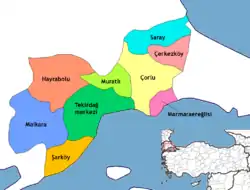Tekirdağ
Tekirdağ (pronounced [teˈciɾdaː]; see also its other names) is a province in the Trakya (Thrace) part of European Turkey on the north coast of the Sea of Marmara. Its capital city is also named Tekirdağ ("Striped Mountain", although see under Etymology). In 2019 the city's population was 204,001.
Tekirdağ | |
|---|---|
Metropolitan municipality | |
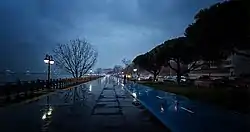 | |
 Emblem of Tekirdağ Metropolitan Municipality | |
 Tekirdağ Location in Turkey  Tekirdağ Location in Turkey's Marmara Region  Tekirdağ Tekirdağ (Europe) | |
| Coordinates: 40°58′40″N 27°30′55″E | |
| Country | |
| Province | Tekirdağ |
| Government | |
| • Mayor | Kadir Albayrak (CHP) |
| Area | |
| • District | 1,111.53 km2 (429.16 sq mi) |
| Elevation | 37 m (121 ft) |
| Population (2019)[2] | |
| • Total | 1,081,065 |
| Time zone | UTC+3 (TRT) |
| Postal code | 59xxx |
| Website | www.tekirdag.bel.tr |
Tekirdağ town is a commercial centre with a harbour for agricultural products (the harbour is being expanded to accommodate a new rail link to the main freight line through Thrace). It is also home to Martas and the BOTAŞ Terminal, both of them important for trade activities in the Marmara Region. The town's best known product remains Tekirdağ rakı although it is also known for its cherries, celebrated with a festival every June. [3]
The proximity of the Greek and Bulgarian borders means that there are honorary consulates for both countries in Tekirdağ town.
Ferries from Tekirdağ sail to the nearby Marmara Islands during the summer.[4]
The nearest airport is Tekirdağ - Çorlu Airport (TEQ) although there are many more flights to Istanbul International Airport (IST).
Names and etymology
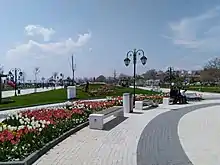
Tekirdağ was called Bisanthe or Bysanthe (Greek: Βισάνθη/Βυσάνθη),[5][6] and also Rhaedestus (Ῥαιδεστός) in classical antiquity. The latter name was used until the Byzantine era,[7] and transformed into Rodosçuk after it fell to the Ottomans in the 14th century (in western languages it is usually rendered as Rodosto). After the 18th century it was called Tekfurdağı, based on the Turkish word tekfur, meaning "Byzantine lord". In time, the name mutated into the Turkish Tekirdağ, and this became the official name under the Turkish Republic. The historical name "Rhaedestos" (transcribed also as Raidestos) is still used in the Greek Orthodox ecclesiastical context (e.g. the Bishop of Raidestos,[8] the Metropolitanate of Heraclia and Raidestos).[9]
Location
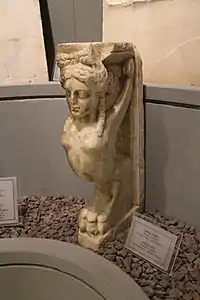
Tekirdağ is situated on the northern coast of the Sea of Marmara, 135 kilometres (84 miles) west of Istanbul. Its picturesque bay is backed by the promontory of the mountain which gives its name to the city, Tekir Dağı (ancient Combos), a spur of about 2000 ft. that rises into the hilly plateau to the north. Between Tekirdağ and Şarköy is another mountain, Ganos Dağı.
Climate
Tekirdağ has a Mediterranean climate (Köppen: Csa, Trewartha: Cs). Summers are hot and humid whilst winters are cool and wet. Snowfall is quite common for a week or two between the months of December and March.
| Climate data for Tekirdağ (1991–2020, extremes 1939–2020) | |||||||||||||
|---|---|---|---|---|---|---|---|---|---|---|---|---|---|
| Month | Jan | Feb | Mar | Apr | May | Jun | Jul | Aug | Sep | Oct | Nov | Dec | Year |
| Record high °C (°F) | 23.9 (75.0) |
24.7 (76.5) |
28.1 (82.6) |
34.3 (93.7) |
33.8 (92.8) |
40.2 (104.4) |
38.4 (101.1) |
37.5 (99.5) |
39.7 (103.5) |
35.1 (95.2) |
27.9 (82.2) |
23.5 (74.3) |
40.2 (104.4) |
| Average high °C (°F) | 8.6 (47.5) |
9.4 (48.9) |
12.0 (53.6) |
16.1 (61.0) |
21.2 (70.2) |
26.0 (78.8) |
28.7 (83.7) |
29.1 (84.4) |
25.1 (77.2) |
20.0 (68.0) |
15.1 (59.2) |
10.4 (50.7) |
18.5 (65.3) |
| Daily mean °C (°F) | 5.2 (41.4) |
5.8 (42.4) |
8.1 (46.6) |
12.0 (53.6) |
17.1 (62.8) |
21.8 (71.2) |
24.4 (75.9) |
24.8 (76.6) |
20.7 (69.3) |
16.1 (61.0) |
11.4 (52.5) |
7.1 (44.8) |
14.5 (58.1) |
| Average low °C (°F) | 2.4 (36.3) |
2.8 (37.0) |
4.8 (40.6) |
8.4 (47.1) |
13.1 (55.6) |
17.4 (63.3) |
19.8 (67.6) |
20.5 (68.9) |
16.7 (62.1) |
12.7 (54.9) |
8.2 (46.8) |
4.2 (39.6) |
10.9 (51.6) |
| Record low °C (°F) | −13.5 (7.7) |
−13.3 (8.1) |
−10.4 (13.3) |
−1.2 (29.8) |
2.7 (36.9) |
8.6 (47.5) |
10.9 (51.6) |
11.0 (51.8) |
3.7 (38.7) |
−1.8 (28.8) |
−7.8 (18.0) |
−10.9 (12.4) |
−13.5 (7.7) |
| Average precipitation mm (inches) | 58.2 (2.29) |
62.7 (2.47) |
53.7 (2.11) |
40.8 (1.61) |
37.8 (1.49) |
37.9 (1.49) |
28.5 (1.12) |
16.4 (0.65) |
45.7 (1.80) |
81.6 (3.21) |
61.2 (2.41) |
76.6 (3.02) |
601.1 (23.67) |
| Average precipitation days | 12.30 | 11.30 | 12.27 | 10.67 | 9.80 | 7.73 | 3.87 | 3.00 | 6.17 | 9.23 | 9.73 | 12.97 | 109.0 |
| Mean monthly sunshine hours | 83.7 | 98.9 | 136.4 | 180.0 | 232.5 | 264.0 | 297.6 | 269.7 | 207.0 | 145.7 | 99.0 | 77.5 | 2,092 |
| Mean daily sunshine hours | 2.7 | 3.5 | 4.4 | 6.0 | 7.5 | 8.8 | 9.6 | 8.7 | 6.9 | 4.7 | 3.3 | 2.5 | 5.7 |
| Source: Turkish State Meteorological Service[10] | |||||||||||||
History
.JPG.webp)
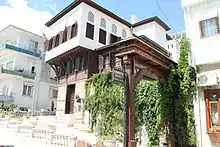
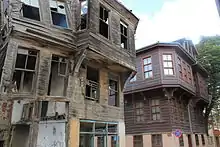
The history of the city of Tekirdağ dates back to around 4000 BC.[11] In Xenophon's Anabasis it is mentioned as part of the kingdom of the Thracian king Seuthes. It is also mentioned as Bisanthe by Herodotus (VII, 137). The city was a Samian colony.[12]
Procopius chronicled the town's restoration by Justinian I in the 6th century AD. In 813 and again in 1206, after the Battle of Rodosto, it was sacked by the Bulgarians, but it continued to appear as a place of considerable importance in later Byzantine times. The 11th-century Byzantine historian Michael Attaleiates owned property in Raidestos which he described in his will. From 1204 to 1235 the town was ruled by the Venetians following the Latin occupation of Constantinople during the Fourth Crusade.
In the Ottoman period the city was successively a part of the Rumelia Eyalet, then of the Province of the Kapudan Pasha, the Silistra Eyalet, and Edirne Vilayet. After 1849 it became the seat of the Sanjak of Tekfürtaği.
Twentieth century
Tekirdağ was occupied twice by the Russian army: firstly, on 22 August 1829 during Russo-Turkish War (1828-1829)[13] and then on 1 February 1878 during the Russo-Turkish War (1877-1878).[14] After these wars, the city returned to Ottoman rule.
In 1905, the city had a population of about 35,000, of whom about half were Greeks[15]
In 1912, after their defeat at the Battle of Luleburgas the retreating Turkish army set fires to several parts of the town and massacred many Christians.[16] After this, Tekirdağ was occupied by the Bulgarian army on 11 November 1912.[17] The city was liberated on 13 July 1913.
Finally, Tekirdağ was occupied by the Greek army on 20 July 1920 during the Turkish War of Independence (1919-1922). After the signing of the Armistice of Mudanya, the city was given back to Turkey on 13 November 1922.[18] Under the terms of the 1923 agreement for the Exchange of Greek Orthodox and Muslim Populations between the two countries, the Greek Christians of Tekirdağ were all forced to leave, their place taken by Muslim Turks from Greece.
In December 1934, a convoy of 1,583 Turkish speaking Muslims from Dobruja and Ada Kaleh settled in Tekirdağ.[19]
For many years Tekirdağ served as a depot for the produce of Edirne province. However, its trade suffered badly when Alexandroupolis became the terminus of the railway up the river Maritsa.
Bishopric
Rhaedestus remains a titular see of the Roman Catholic Church. [20] However, Roman Catholic Church activity has long ceased.
Catholic bishops
- Emmet Michael Walsh 8 September 1949 16 November 1952
- Manuel Alfonso de Carvalho 10 February 1953 17 June 1957
- Wilson Laus Schmidt 5 September 1957 18 May 1962
- Carlos Horacio Ponce de Léon 9 June 1962 28 April 1966
Tekirdağ today
.JPG.webp)

.jpg.webp)

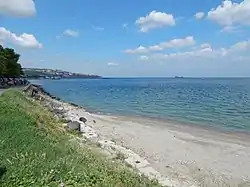
The Tekirdağ area is the site of many holiday homes, as the city is only two hours drive from Istanbul via a new four-lane highway. The villages of Şarköy, Mürefte and Kumbağ are particularly popular with Turkish tourists. The Marmara Sea is polluted but there are still a number of public beaches near Tekirdağ, especially the Yeniçiftlik beaches.
Most Ottoman wooden buildings have been replaced by concrete apartment blocks although some are being restored or replaced with attractive replicas. Except for the , and the narrow streets that help one imagine life in the Ottoman period, the city lacks antique charm. One reason to visit is the local delicacy, the small spicy cylindrical grilled meatballs called Tekirdağ köftesi, traditionally followed by courses of a sweet local cheese and semolina pudding.
The inland parts of Tekirdağ province offer fertile farmland suitable for winter wheat, sunflowers, cherries and grapes for wine-making.
Both the east–west highway (the Via Egnatia of Roman times) and the highway north toward Muratlı and Lüleburgaz are four lanes. There is a prison next to the rakı distillery and another north of the city on the road to Muratlı.
On the eastern edge of the city is the Namık Kemal University, founded in 2006, which has three faculties.
Attractions
In Tekirdağ town
- The Rüstem Paşa Mosque, built by the Ottoman architect, Mimar Sinan, in 1553[22]
- The Tekirdağ Museum of Archaeology and Ethnography contains archaeological artefacts found in and around the province, as well as ethnographical items used by the residents of the region.[23]
- The Namık Kemal House Museum is devoted to the life and works of theTurkish nationalist poet Namık Kemal (1840–1888).[24]
- The Rakoczi Museum is an 18th-century Turkish house, where the Hungarian national hero, Francis II Rákóczi lived during his exile from 1720 until his death in 1735. Today, it is the property of Hungary.[25]
- Of all Turkey's many statues of Atatürk, the one in Teikrdağ town centre is the only one that was made exactly life-size.
Around Tekirdağ province
- The Kutman Wine Museum is at Mürefte in Şarköy
Notable people
- Phaedimus of Bisanthe (3rd or 2nd century BC), ancient Greek poet
- Francis II Rákóczi (1676–1735), Hungarian prince and national hero
- Bekri Mustafa Pasha (1688–1698), Ottoman grand vizier
- Kelemen Mikes (1690–1761), Hungarian political figure and essayist
- Cezayirli Gazi Hasan Pasha (1713-90)
- Namık Kemal (1840–1888), nationalist poet
- Memduh Şevket Esendal (1883–1952), writer
- Tekirdağlı Hüseyin Pehlivan, wrestling champion (1908-82)
- Solomon Maimon (Rabbi) (1918–2019), American Sephardic Rabbi
- Henri Verneuil (1920–2002), playwright and filmmaker
- Nefise Akçelik (1955–2003), civil engineer specializing in tunnel building
- Erhan Tabakoglu (born 1967), professor and rector of the Trakya University
- Rifat Karlova (born 1980), comedian and actor residing in Taiwan
- Emre Tetikel (born 1985), actor and novelist
Twin towns – sister cities
Namesakes
- Tekirdağ Province, which contains Tekirdağ
- TC-JGE, a Turkish Airlines Boeing 737-800 which crashed as Flight 1951 on 25 February 2009[27]
- TC-JMJ, a Turkish Airlines Airbus A321
See also
- Tsar Kaloyan of Bulgaria, destroyer of Rodosto in 1206.
- Turkish Airlines Flight 1951, A Boeing 737-800 that crashed. Named after this city.
Gallery
 Mother goddess shaped pot (Tekirdağ Museum of Archaeology and Ethnography)
Mother goddess shaped pot (Tekirdağ Museum of Archaeology and Ethnography) Thracian King Cersobleptes (Tekirdağ Museum of Archaeology and Ethnography)
Thracian King Cersobleptes (Tekirdağ Museum of Archaeology and Ethnography) Amphoras (Tekirdağ Museum of Archaeology and Ethnography)
Amphoras (Tekirdağ Museum of Archaeology and Ethnography) Orta Mosque (1855)
Orta Mosque (1855) Bedesten (Ottoman Bazaar)
Bedesten (Ottoman Bazaar) Provincial Government House
Provincial Government House Tekirdağ Köfte, a local type of meatball
Tekirdağ Köfte, a local type of meatball.JPG.webp) Street near the Rákóczi Museum
Street near the Rákóczi Museum
References
- Notes
- "Area of regions (including lakes), km²". Regional Statistics Database. Turkish Statistical Institute. 2002. Retrieved 5 March 2013.
- "Population in Turkey". TUIK. TUIK. 4 February 2020. Retrieved 30 November 2020.
- "Tekirdag Festivals - Tekirdag Annual Events". www.tekirdag.com. Retrieved 30 September 2022.
- "Ferry Services Istanbul & Sea of Marmara, Turkey". turkeytravelplanner.com. Retrieved 30 September 2022.
- Playfair, James (1812). "A System of Geography, Ancient and Modern". google.gr.
- "Full text of "Hellenica; Books I-II"". archive.org. 1888.
- See: Warren Treadgold, The Middle Byzantine Historians (Palgrave Macmillan, 2013)
- "Ecumenical Patriarchate – George Raidestinos I". ec-patr.net.
- Kiminas, Demetrius (March 2009). The Ecumenical Patriarchate. google.gr. ISBN 9781434458766.
- "Resmi İstatistikler: İllerimize Ait Mevism Normalleri (1991–2020)" (in Turkish). Turkish State Meteorological Service. Retrieved 11 April 2021.
- "History of Tekirdağ". Archived from the original on 6 February 2007. Retrieved 22 March 2007.
- Scott, Lionel (July 2017). Historical Commentary on Herodotus. BRILL. p. 160. doi:10.1163/9789047407980. ISBN 978-90-47-40798-0.
- https://tez.yok.gov.tr/UlusalTezMerkezi/TezGoster?key=WBc656i315e2eV6-EZV1ogoKkXx2Z6eCeqskADWmfHFDzY2EQsaUQYdI1d0xFuwT Ahıska Türkleri (1800-1821), Unpublished Doctoral Thesis, page 189, 2015
- http://acikerisim.dicle.edu.tr/xmlui/bitstream/handle/11468/4685/583824.pdf?sequence=1&isAllowed=y Rus Kaynaklarına Göre 1877-1878 Osmanlı-Rus Harbi (″1877-1878 Ottoman-Russian War according to Russian sources″), Unpublished Master of Science Thesis, page 175, 2019
- Volume V23, Page 448 of the 1911 Encyclopædia Britannica
- "THE LATEST". The Bendigo Independent. No. 13, 049. Victoria, Australia. 8 November 1912. p. 5. Retrieved 9 July 2018 – via National Library of Australia.
- https://www.msb.gov.tr/Content/Upload/Docs/askeritariharsiv/balkan_harbi_kronoloji.pdf Balkan Harbi Kronolojisi (″Chronology of Balkan War″), page 61
- http://www.tekirdag.gov.tr/tekirdag-tarihi
- https://www.acarindex.com/dosyalar/makale/acarindex-1423873237.pdf
- Rhaedestus At catholic-hierarchy.org.
- "Tekirdag Raki | Sarap.Online Turkish Wines and Spirits". 31 May 2020. Retrieved 30 September 2022.
- "TEKİRDAĞ". www.turkeyfromtheinside.com. Retrieved 30 September 2022.
- "TEKİRDAĞ". www.turkeyfromtheinside.com. Retrieved 30 September 2022.
- "TEKİRDAĞ". www.turkeyfromtheinside.com. Retrieved 30 September 2022.
- "TEKİRDAĞ". www.turkeyfromtheinside.com. Retrieved 30 September 2022.
- "Study in Turkey". intrelations.nku.edu.tr. International Relations Center of Tekirdağ Namık Kemal University. Retrieved 7 February 2021.
- "Accident Information Page". Turkish Airlines. Retrieved 26 February 2009.
External links
 Tekirdağ travel guide from Wikivoyage
Tekirdağ travel guide from Wikivoyage- Official website
- Tekirdağ photo gallery
